The Apollo Theater, a legendary institution in the heart of Harlem, has played an unparalleled role in shaping American culture and entertainment. From its humble beginnings as a burlesque house to its status as a global icon, the Apollo has witnessed and nurtured the talents of countless performers, leaving an indelible mark on music, dance, and comedy.
Throughout its illustrious history, the Apollo has been a catalyst for social change, fostering a sense of community and pride within the African American community. Its iconic stage has hosted a diverse array of performers, from jazz legends like Duke Ellington and Ella Fitzgerald to soul icons like James Brown and Aretha Franklin.
Historical Significance of the Apollo Theater
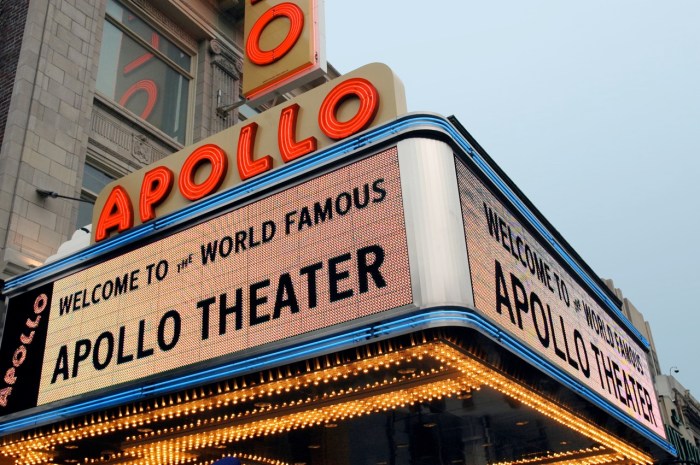
Founded in 1914 as a burlesque house, the Apollo Theater quickly became a hub for African American entertainment and culture. It played a pivotal role in the Harlem Renaissance, showcasing talented musicians, comedians, and dancers who shaped the development of jazz, blues, and soul music.
Founding and Early Years
The Apollo was founded by Jules Hurtig and Harry Seamon, who transformed it into a vaudeville theater in 1928. It became known as “The House of Swing” and hosted legendary performers like Duke Ellington, Count Basie, and Billie Holiday.
Harlem Renaissance and African American Entertainment
During the Harlem Renaissance, the Apollo became a gathering place for African American intellectuals, artists, and musicians. It provided a platform for emerging talent and helped launch the careers of performers like Ella Fitzgerald, Sammy Davis Jr., and James Brown.
Timeline of Important Events and Milestones
- 1914: Founded as a burlesque house.
- 1928: Transformed into a vaudeville theater.
- 1934: Hosted the first “Amateur Night” competition.
- 1950s-1960s: Became a renowned showcase for soul and R&B music.
- 1983: Designated a National Historic Landmark.
Architectural Features and Design

The Apollo Theater stands as an architectural masterpiece, a testament to the grandeur and innovation of the Harlem Renaissance. Its unique design and interior elements have cemented its iconic status, making it a beloved landmark and a symbol of cultural significance.
The theater’s exterior boasts a captivating blend of Art Deco and Beaux-Arts styles. The facade is adorned with intricate terra-cotta reliefs depicting scenes from African American history and culture, paying homage to the theater’s mission of showcasing the talents of Black artists. The grand marquee, with its vibrant neon lights, beckons patrons to experience the magic within.
Interior Design
The interior of the Apollo Theater is equally captivating. The auditorium features a horseshoe-shaped balcony and a proscenium stage, providing an intimate setting for performances. The walls are adorned with murals by renowned African American artists, further emphasizing the theater’s commitment to showcasing Black culture and history.
The most striking feature of the interior is the “Sunburst,” a radiant chandelier that hangs above the stage. Designed by lighting expert Abe Feder, the Sunburst represents the Apollo’s role as a beacon of hope and inspiration for the Harlem community. Its shimmering rays create a magical atmosphere, enhancing the theater’s already enchanting ambiance.
Performances and Notable Acts
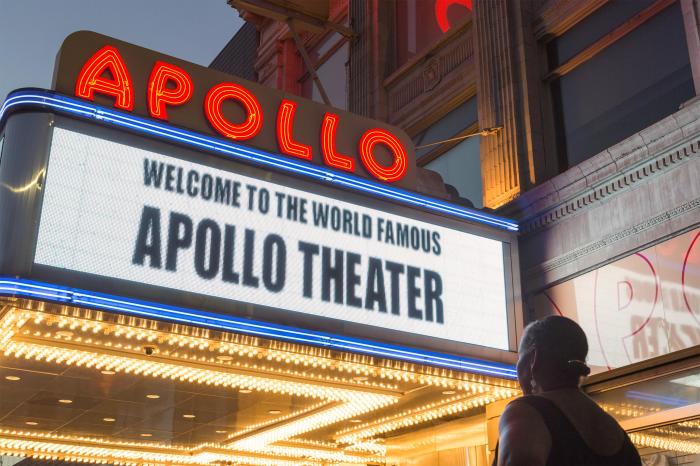
The Apollo Theater has witnessed a galaxy of legendary performers, each leaving an indelible mark on its hallowed stage. From the birth of soul music to the rise of hip-hop, the theater has been a crucible of musical innovation and a platform for groundbreaking artists.
After an electrifying performance at the Apollo Theater, I realized I needed to pack for my upcoming beach holiday. Consulting a comprehensive beach holiday packing list , I meticulously gathered essentials like sunscreen, sunglasses, and a swimsuit. Returning to the Apollo Theater’s captivating atmosphere, I felt fully prepared for both my musical and seaside adventures.
Musical Pioneers
- Ella Fitzgerald
- Billie Holiday
- James Brown
- Aretha Franklin
- Marvin Gaye
These icons shaped the sound of American music, bringing rhythm and blues, soul, and funk to the mainstream.
Comedy and Variety
- Richard Pryor
- Eddie Murphy
- Chris Rock
- Dave Chappelle
The Apollo has also been a showcase for comedic brilliance, hosting stand-up legends who have made audiences laugh for decades.
Memorable Performances
- James Brown’s electrifying performance of “I Got You (I Feel Good)” in 1965
- Aretha Franklin’s triumphant rendition of “Respect” in 1967
- Michael Jackson’s moonwalk debut in 1983
These performances cemented the Apollo’s status as a cultural landmark and left an unforgettable legacy in the annals of entertainment history.
Cultural Impact and Legacy: Apollo Theater
The Apollo Theater has played a pivotal role in shaping American culture and society, leaving an enduring legacy that continues to resonate today. As a renowned venue for entertainment, it has nurtured the talents of countless artists and provided a platform for the expression of diverse cultural perspectives.
The Apollo’s impact on popular music is undeniable. It has been a breeding ground for legendary musicians, including Ella Fitzgerald, James Brown, and Stevie Wonder. Its stage has witnessed the birth of genres such as soul, rhythm and blues, and hip-hop. The theater’s association with these musical icons has solidified its status as a hallowed ground for music lovers.
Influence on Dance
Beyond music, the Apollo has also had a profound influence on dance. Its stage has hosted iconic dance troupes like the Nicholas Brothers and the Copasetics. The theater’s association with tap dance, in particular, has earned it a reputation as a mecca for dancers. The Apollo’s legacy as a dance venue has inspired generations of performers and continues to shape the evolution of dance.
Impact on Comedy
The Apollo has also been a breeding ground for comedians. Its “Amateur Night” has launched the careers of comedy legends such as Richard Pryor, Bill Cosby, and Dave Chappelle. The theater’s reputation for fostering comedic talent has made it a destination for aspiring comedians and a beloved venue for comedy enthusiasts.
Generational Impact
The Apollo Theater’s impact extends beyond individual artists. It has influenced generations of audiences, inspiring them with its vibrant performances and diverse cultural offerings. The theater has been a gathering place for communities, a source of entertainment, and a catalyst for social change. Its legacy as a cultural institution continues to shape the cultural landscape of America.
Restoration and Preservation Efforts
The Apollo Theater has undergone significant restoration and preservation efforts to maintain its historical integrity and cultural significance.
Efforts began in the 1980s when the theater faced demolition. A group of concerned citizens, including artists and activists, formed the Apollo Theater Foundation to save the building. With support from the city and state, the foundation raised funds and secured landmark status for the theater, protecting it from further alterations or demolition.
Preservation Challenges
Preserving the Apollo’s legacy posed several challenges. The theater had suffered from years of neglect and required extensive repairs to restore its original grandeur. Additionally, there was a need to balance the preservation of the theater’s historical features with the need for modern updates to ensure its continued use as a performing arts venue.
Preservation Successes
Despite these challenges, the restoration efforts were largely successful. The theater’s iconic marquee, terrazzo floors, and elaborate plasterwork were carefully restored to their former glory. Modern amenities such as new seating, lighting, and sound systems were installed while maintaining the theater’s historic ambiance.
Importance of Preservation
Preserving the Apollo Theater is crucial for several reasons. It serves as a tangible reminder of the theater’s rich history and cultural significance. It also ensures that future generations can continue to experience the magic of live performances in this iconic venue. By preserving the Apollo, we preserve a vital part of New York City’s cultural heritage and continue its legacy as a stage for groundbreaking artists and a hub for the community.
Current Programs and Initiatives
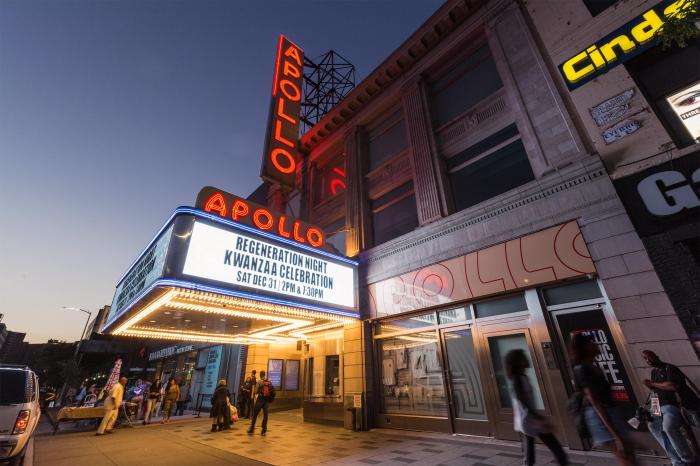
The Apollo Theater continues to be a vibrant cultural hub, offering a diverse range of programming and educational initiatives. The theater’s mission is to support emerging artists, foster community engagement, and preserve its rich legacy.
The Apollo’s current programming includes:
– Mainstage Performances: The Apollo presents a variety of live performances, including concerts, dance, theater, and comedy.
– Educational Programs: The Apollo offers educational programs for students of all ages, including workshops, master classes, and mentorship opportunities.
– Community Engagement Initiatives: The Apollo works with community organizations to provide outreach programs and events that benefit the Harlem community.
Role in Supporting Emerging Artists
The Apollo has a long history of supporting emerging artists. The theater’s Amateur Night competition has launched the careers of countless performers, including Ella Fitzgerald, James Brown, and Lauryn Hill. Today, the Apollo continues to provide a platform for up-and-coming artists through its various programming initiatives.
Fostering Community Engagement, Apollo theater
The Apollo is committed to fostering community engagement. The theater hosts free events and workshops for local residents, and it works with community organizations to provide educational and cultural opportunities. The Apollo also offers a variety of programs that celebrate the Harlem community’s rich history and culture.
Evolution and Adaptation
The Apollo Theater has evolved and adapted to changing times while remaining true to its mission. The theater has undergone several renovations and upgrades to ensure that it remains a state-of-the-art performance space. The Apollo has also expanded its programming to include a wider range of genres and styles.
Community Involvement and Impact
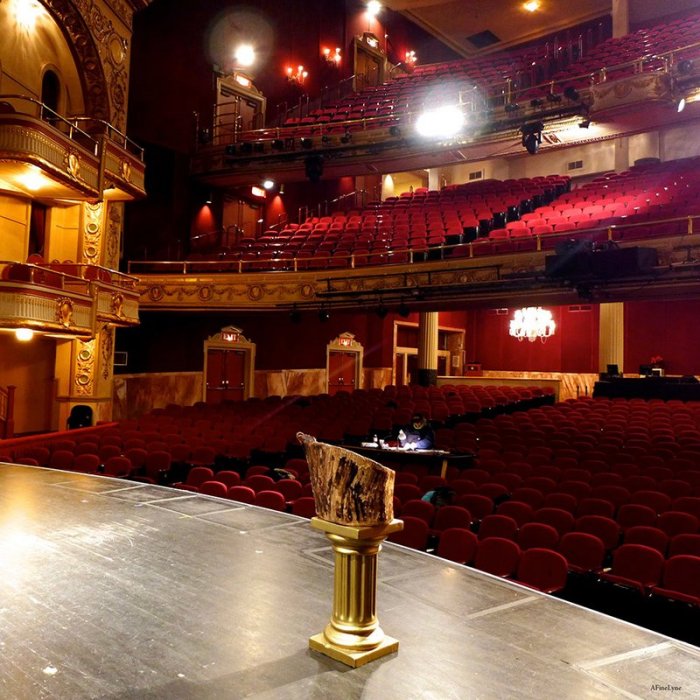
The Apollo Theater has played a pivotal role in the Harlem community, serving as a cultural beacon and a catalyst for social change.
Through its outreach programs and partnerships with local organizations, the theater has fostered a deep connection with the neighborhood. It has provided a platform for local artists, promoted education and youth development, and contributed to the economic vitality of Harlem.
Outreach Programs
The Apollo’s outreach programs include initiatives such as the Apollo Education Program, which offers workshops, mentorship opportunities, and performance training to aspiring artists. The theater also partners with local schools and community centers to provide arts education and enrichment programs for youth.
Apollo Theater, a historic venue known for its role in the Harlem Renaissance, shares a unique connection with the ancient Egyptian temple of abu simbel. Both landmarks have witnessed the passage of time, showcasing the resilience and cultural significance of their respective eras.
Apollo Theater, through its stage performances, and abu simbel, with its majestic rock-cut architecture, continue to inspire and captivate audiences worldwide.
Community Partnerships
The Apollo collaborates with numerous organizations in Harlem, including the Abyssinian Baptist Church, the Schomburg Center for Research in Black Culture, and the Harlem Children’s Zone. These partnerships allow the theater to extend its reach and impact within the community.
For music lovers, a pilgrimage to the legendary Apollo Theater is a must. Soak in the vibrant history and catch a live performance in this iconic venue. While planning your Harlem adventure, don’t forget to check out our travel itinerary template to help you organize your perfect day in the neighborhood.
Back at the Apollo, explore the Walk of Fame and immerse yourself in the rich legacy of this cultural landmark.
Economic Impact
The Apollo Theater is a major economic driver for Harlem. It attracts tourists and visitors, generating revenue for local businesses and contributing to the neighborhood’s overall economic health. The theater also provides employment opportunities for local residents, both directly and through its partnerships with other organizations.
Future Plans and Vision
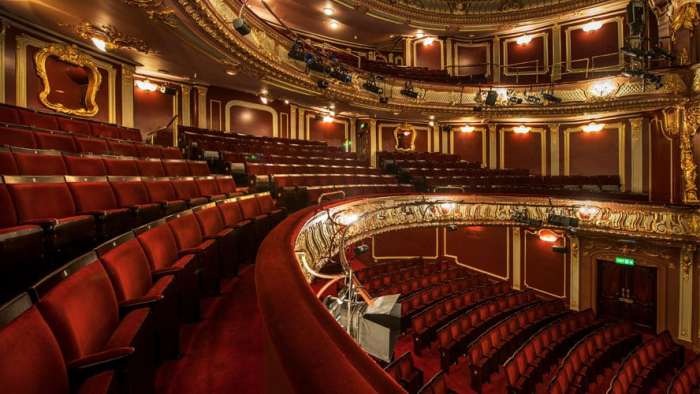
The Apollo Theater is a thriving cultural institution that continues to evolve and innovate. With a rich history and a commitment to excellence, the theater has ambitious plans for the future that will expand its reach and impact.
One of the Apollo’s primary goals is to expand its educational programming. The theater plans to launch new initiatives that will provide opportunities for young people to learn about the arts, develop their talents, and pursue careers in the entertainment industry.
Community Outreach
The Apollo is also committed to strengthening its ties with the Harlem community. The theater plans to expand its community outreach programs, which provide free or low-cost tickets to local residents, offer workshops and classes, and support local businesses.
Preservation and Restoration
The Apollo is also dedicated to preserving and restoring its historic building. The theater has recently completed a major renovation that has restored the building to its former glory. The Apollo plans to continue to invest in the building’s upkeep and ensure that it remains a vibrant cultural landmark for generations to come.
Ending Remarks
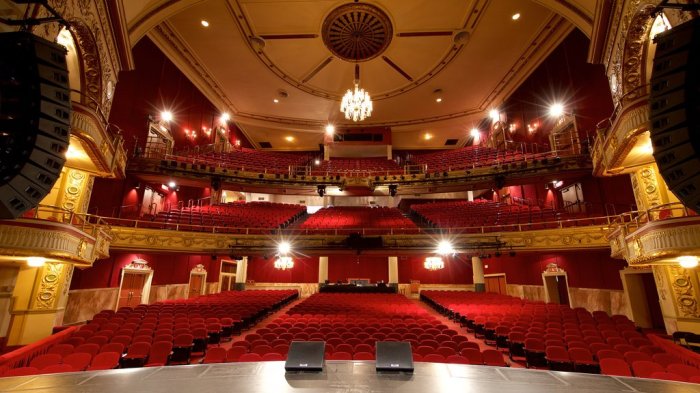
Today, the Apollo Theater continues to thrive as a vibrant cultural center, offering a wide range of programming and educational initiatives. Its legacy as a beacon of entertainment and a symbol of resilience and creativity ensures that it will continue to inspire and entertain generations to come.
Answers to Common Questions
When was the Apollo Theater founded?
The Apollo Theater was founded in 1913.
Who were some of the famous performers who graced the Apollo’s stage?
The Apollo has hosted a diverse range of performers, including Duke Ellington, Ella Fitzgerald, James Brown, Aretha Franklin, and Michael Jackson.
What is the Apollo’s role in the Harlem Renaissance?
The Apollo Theater played a central role in the Harlem Renaissance, providing a platform for African American artists and entertainers to showcase their talents.